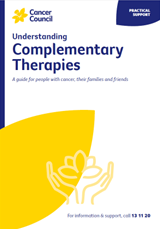- Home
- About Cancer
- Living well
- Complementary therapies
- Safety concerns
- Regulation of medicines
Regulation of medicines
What is the Therapeutic Goods Administration (TGA)?
The Therapeutic Goods Administration (TGA) is an Australian Government department that assesses and monitors (regulates) all therapeutic goods and medicines sold in Australia. This includes complementary medicines such as herbs, vitamins, minerals, nutritional supplements, homeopathic remedies and some aromatherapy products.
The regulation of complementary medicines helps to protect the public. It helps ensure that therapeutic goods are produced to an acceptable standard of safety and quality (good manufacturing practice) and that any adverse reactions can be investigated.
The Australian Register of Therapeutic Goods (ARTG)
Most therapeutic goods supplied in Australia – whether made in Australia or overseas – must be included on the Australian Register of Therapeutic Goods (ARTG). Some homeopathic preparations are exempt from this requirement. You can search the ARTG online to find a specific medicine.
Medicine codes and levels of risk
To be included on the ARTG, medicines will be given one of the following codes depending on the level of risk. This code must be displayed on the medicine label.
| AUST L (listed) | These products make low-level health claims and contain pre-approved low-risk ingredients. They are reviewed for safety and quality only, not for how well they work. Products in this category include sunscreen, vitamin and mineral supplements, and herbal medicines. These products are available at supermarkets, health food stores and pharmacies, and you don’t need a prescription. |
| AUST L(A) (assessed listed) | These products make higher-level health claims than other listed medicines and contain pre-approved ingredients. The TGA assesses them for safety, quality and whether the scientific evidence shows that the product does what it says it does. These products may include the “TGA assessed” symbol on the label and are sold at pharmacies, supermarkets and health food stores. |
| AUST R (registered) | Because these products are considered higher risk, they are evaluated by the TGA for safety, quality and whether the scientific evidence shows that the medicine does what it claims. They include all prescription medicines, most over-the-counter medicines and some higher-risk complementary medicines. Registered complementary medicines may include the “TGA assessed” symbol on the label. |
Many pharmacies and health food stores sell herbal preparations. For more information on the safety, labelling and regulation of these medicines, visit Therapeutic Goods Administration (TGA).
→ READ MORE: Regulation of complementary therapists
Meditation and Relaxation Podcast
Listen to more of our meditation and relaxation podcast for people affected by cancer
More resources
Dr David Joske, Clinical Haematologist, Sir Charles Gairdner Hospital and PathWest, Chairman and Founder Solaris Cancer Care Foundation, Clinical Professor of Medicine, The University of Western Australia, WA; Australasian Integrative Medicine Association (AIMA); Dr Robert Blum, Clinical Director, Cancer Services, Bendigo Health, NSW; Sally Brooks, Senior Pharmacist, Medicines Information, Peter MacCallum Cancer Centre, VIC; Dr Suzanne Grant, Senior Research Fellow, NICM Health Research Institute, Western Sydney University, and Chris O’Brien Lifehouse, NSW; Prof Danforn Lim, Adjunct Professor and Advisory Board Member, NICM Health Research Institute, Western Sydney University, and Adjunct Professor, UTS, NSW; Christina Line, Statewide Services Senior Coordinator, Cancer Council WA; Jen McKenzie, Physiotherapist (Lymphoedema) and ESSA Accredited Exercise Physiologist, The McKenzie Clinic, QLD; Simone Noelker, Wellness Centre and Pastoral Care Manager, Ballarat Regional Integrated Cancer Centre, VIC; Dr Nirzari Pandit, General Practitioner, RACGP Specific Interests Integrative Medicine Group, NSW; Georgie Pearson, Consumer; Cris Pirone, Counsellor, Cancer Council SA; Dr Elysia Thornton-Benko, Specialist General Practitioner, and UNSW Research Fellow, NSW; Kirsty Trebilcock, 13 11 20 Consultant, Cancer Council SA.
View the Cancer Council NSW editorial policy.
View all publications or call 13 11 20 for free printed copies.

